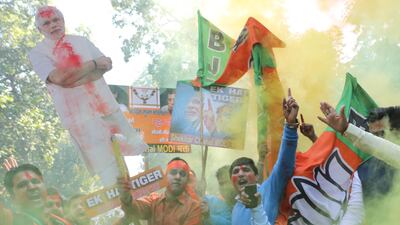Indian prime minister Narendra Modi’s party surged towards victories in state elections in Himachal Pradesh and Gujarat - but not before the opposition Congress put up a surprisingly strong fight, particularly in Mr Modi’s native Gujarat.
Polls were held in Himachal Pradesh on November 9 and in Gujarat on December 9 and 14. The counting of votes began on Monday.
By mid-afternoon, the Bharatiya Janata Party (BJP) had won or was leading in 99 out of 182 seats in Gujarat, heading for its fifth straight win in the state. But its tally had shrunk from the 115 it notched up in 2012.
The Congress, which won 61 seats in 2012, had looked to be keeping up with the BJP early on Monday but by mid-afternoon it had won or was ahead in only 77.
Rahul Gandhi, who assumed leadership of the party last week, said he was “satisfied, not disappointed” with the results from Gujarat.
In the hill state of Himachal Pradesh, though, the Congress lost power. It had won 36 out of 68 seats in 2012, but on Monday afternoon it was set to claim just 21 seats. The BJP was on course to take 44 seats, up from its tally of 26 five years ago.
Based on the numbers, the election results indicate a strengthening of the BJP’s grip on Indian politics. Since 2014, when the BJP routed the Congress in parliamentary elections and Mr Modi became prime minister, he has led his party to win after win in state polls, including six of the seven held this year. The BJP now governs 19 out of India’s 29 states, either by itself or with an allied party. On a map, the party's saffron colour covers most of the country with the exception of a few areas in the south and the east.
But the tone of the BJP's campaign, as well as the Congress’ improved performance in Gujarat, suggests that this time the party did not enjoy the easy ride into power it might have expected.
In the past two weeks, BJP leaders including Mr Modi resorted to personal attacks against members of the Congress. Most infamously, Mr Modi last week accused Manmohan Singh, the former Congress prime minister, of colluding with the Pakistani government to “rig” the Gujarat polls in some unspecified way.
“What was the reason for holding such a secret meeting?” Mr Modi asked at a rally on December 10, referring to a dinner attended by Mr Singh and Pakistani diplomats at a Congress leader’s house. “Brothers and sisters, don't these developments raise questions? Aren't they worrisome?”
Mr Modi and other BJP leaders also likened Mr Gandhi to a number of Muslim emperors who ruled India — comparisons designed to appeal to the party’s Hindu right-wing base.
The BJP’s nationalist rhetoric, as well as incidents such as the leak of a “sex video” purportedly featuring Hardik Patel, a firebrand activist allied to the Congress, lent the election campaign a shrill and sordid tone.
Mr Patel himself used divisive rhetoric, calling upon specific castes to vote for the Congress in return for quotas in government jobs, said M Runa, a 32-year-old content writer in Ahmedabad, the biggest city in Gujarat.
“He didn’t say particularly decent things either,” she said.
Ms Runa comes from a family of cloth traders, which was hit badly by two of Mr Modi’s schemes over the past year. The first was the sudden withdrawal of large-denomination banknotes last December, in an effort to root out corruption, followed by the introduction of a complicated goods and services tax in July.
Economic activity in India — buying by consumers, as well as business expenditures — slowed as a result of these schemes. “My parents had to shut the shop early every day and come home, because there was no work to do,” she said.
Despite this, her family never wavered in its support for Mr Modi and his party.
“We looked at this as a hiccup,” Ms Runa said. “The moves were in a good cause, and they would have positive effects in the long run. My family trusts the party. Whereas the Congress, without Hardik Patel’s support, doesn’t really have too much of a presence in this state.”
Nevertheless, she said, the electorate also sent a distinct message to the BJP.
“There’s a lesson here for the party: that it won’t win a landslide automatically, every time,” Ms Runa said. “It has to keep working for the people. Otherwise things can change, and things will change.”

